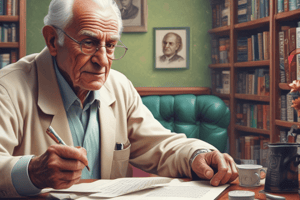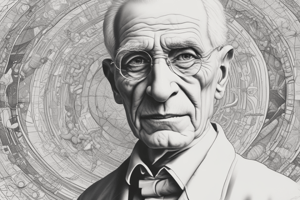Podcast
Questions and Answers
What was Karl Popper's criterion of demarcation between what is, and is not, genuinely scientific?
What was Karl Popper's criterion of demarcation between what is, and is not, genuinely scientific?
- Observability
- Falsifiability (correct)
- Repeatability
- Consensus
What did Popper believe was the goal of theories?
What did Popper believe was the goal of theories?
- To claim certainty
- To eliminate errors (correct)
- To justify beliefs
- To establish consensus
What did Popper believe about scientific knowledge?
What did Popper believe about scientific knowledge?
- It is based on authority
- It is certain and absolute
- It is conjectural or hypothetical (correct)
- It is based on consensus
What did Popper propose as a solution to the problem of induction?
What did Popper propose as a solution to the problem of induction?
What did Popper warn against in terms of tolerance?
What did Popper warn against in terms of tolerance?
What did Popper believe about the conspiracy theory of society?
What did Popper believe about the conspiracy theory of society?
What did Popper propose as a solution to the problem of free will?
What did Popper propose as a solution to the problem of free will?
What did Popper believe about socialism and individual liberty?
What did Popper believe about socialism and individual liberty?
What did Popper propose as a solution to the problem of historicism?
What did Popper propose as a solution to the problem of historicism?
Flashcards are hidden until you start studying
Study Notes
Life and Career:
- Karl Popper was an Austrian-British philosopher, academic and social commentator born in Vienna in 1902 to upper-middle-class parents.
- He rejected classical inductivist views on the scientific method in favour of empirical falsification.
- Popper was opposed to the classical justificationist account of knowledge, which he replaced with critical rationalism.
- He was known for his vigorous defence of liberal democracy and the principles of social criticism that he believed made a flourishing open society possible.
- Popper's political philosophy embraced ideas from major democratic political ideologies, including libertarianism/classical liberalism, socialism/social democracy and conservatism, and attempted to reconcile them.
- Popper left school at the age of 16 and attended lectures in mathematics, physics, philosophy, psychology and the history of music as a guest student at the University of Vienna.
- He worked in street construction for a short time but was unable to cope with the heavy labour.
- In 1937, Popper finally managed to get a position that allowed him to emigrate to New Zealand, where he became a lecturer in philosophy at Canterbury University College of the University of New Zealand in Christchurch.
- In 1946, after the Second World War, he moved to the United Kingdom to become a reader in logic and scientific method at the London School of Economics (LSE), a constituent School of the University of London.
- Popper retired from academic life in 1969, though he remained intellectually active for the rest of his life.
- Popper died of "complications of cancer, pneumonia and kidney failure" in Kenley at the age of 92 on 17 September 1994.
- His estate is managed by his secretary and personal assistant Melitta Mew and her husband Raymond.
Honours and Awards:
- Popper won many awards and honours in his field, including the Lippincott Award of the American Political Science Association, the Sonning Prize, and the Otto Hahn Peace Medal of the United Nations Association of Germany in Berlin.
- He received the Humanist Laureate Award from the International Academy of Humanism.
- He was knighted by Queen Elizabeth II in 1965, and was elected a Fellow of the Royal Society in 1976.
- He was invested with the Insignia of a Companion of Honour in 1982.
- In 1992, he was awarded the Kyoto Prize in Arts and Philosophy for "symbolising the open spirit of the 20th century" and for his "enormous influence on the formation of the modern intellectual climate".
Philosophy:
-
Popper's philosophy was characterised by his rejection of the classical justificationist account of knowledge in favour of critical rationalism.
-
He believed that scientific theory, and human knowledge generally, is irreducibly conjectural or hypothetical, and is generated by the creative imagination to solve problems that have arisen in specific historico-cultural settings.
-
Logically, no number of positive outcomes at the level of experimental testing can confirm a scientific theory, but a single counterexample is logically decisive; it shows the theory, from which the implication is derived, to be false.
-
Popper took falsifiability as his criterion of demarcation between what is, and is not, genuinely scientific: a theory should be considered falsifiable.Summary Title: The Philosophy of Karl Popper
-
Popper believed that a scientific statement is only scientific if it is falsifiable and inter-subjective.
-
Popper argued that scientific knowledge is an evolutionary process characterized by conjectures and error elimination.
-
Popper disagreed with Niels Bohr's instrumentalism and supported Albert Einstein's realist approach to scientific theories.
-
Popper claimed to have solved the philosophical problem of induction.
-
Popper believed that rationality is not restricted to the realm of empirical or scientific theories, but that it is merely a special case of the general method of criticism.
-
Popper's principle of falsifiability runs into difficulties when the epistemological status of mathematics is considered.
-
Popper developed a critique of historicism and a defense of the "Open Society."
-
Popper initially saw totalitarianism as exclusively right-wing in nature, but later began to see Soviet-type communism as a form of totalitarianism.
-
Popper believed that socialism was a "beautiful dream," but incompatible with individual liberty.
-
Popper's criticism of historicism was influenced by an event in 1919 during a Communist riot in which the police shot several unarmed people, including some of Popper's friends.
-
Popper believed that the goal of theories is not to claim certainty or justification, but to eliminate errors in them.
-
Popper's philosophy resembles Charles Peirce's nineteenth-century fallibilism.Summary of "Karl Popper"
-
Karl Popper was a philosopher who is known for his work on the philosophy of science, politics, and metaphysics.
-
He was a strong opponent of totalitarianism and dedicated one of his books to the victims of fascism and communism.
-
Popper co-founded the Mont Pelerin Society but did not fully agree with its ideology and recommended the inclusion of socialists.
-
Popper warned against unlimited tolerance and argued that tolerance should not be extended to those who are intolerant.
-
He criticized the "conspiracy theory of society" and argued that it cannot be right because nothing ever comes off exactly as intended.
-
Popper developed the notion of verisimilitude or "truthlikeness," which allows the evaluation of one theory as more or less true than another on a quantitative basis.
-
He proposed three worlds: World One, being the physical world; World Two, being the world of mind; and World Three, being the body of human knowledge expressed in its manifold forms.
-
Popper had his own sophisticated views on evolution and formulated the spearhead model of evolution, a version of genetic pluralism.
-
Popper revised his view on the creation-evolution controversy and found some validity in the controversy.
-
Popper and John Eccles speculated on the problem of free will for many years, generally agreeing on an interactionist dualist theory of mind.
-
Popper revisited the idea of quantum indeterminacy as a source of human freedom and called for a combination of randomness and control to explain freedom.
-
Popper's work has influenced many contemporary philosophers and continues to be a subject of study and debate.Karl Popper: Life, Work, and Influence
-
Popper formulated the two-stage model of free will, which he compared to Darwinian evolution and natural selection.
-
He was agnostic about the existence of God, but felt grateful for the gift of life and was tolerant of religious beliefs.
-
Popper founded the Department of Philosophy, Logic and Scientific Method at the London School of Economics in 1946, where he influenced Imre Lakatos and Paul Feyerabend.
-
Popper had a close friendship with economist Friedrich Hayek, who he considered one of the thinkers he learned the most from.
-
Popper's influence has extended beyond the academy, with billionaire investor George Soros being one of his students at LSE.
-
Popper's philosophy of falsification has been criticized for being overly simplistic and not accounting for the complexities of scientific problem-solving.
-
The Quine-Duhem thesis argues that it is impossible to test a single hypothesis on its own.
-
Popper's philosophy has been debated by other philosophers, including Thomas Kuhn and Imre Lakatos.
-
Popper's philosophy has been criticized for its treatment of psychoanalysis and Freudian theory.
-
Popper's scholarship has been criticized for his rejection of Plato and Hegel.
-
Popper wrote several books, including The Open Society and Its Enemies and Conjectures and Refutations.
-
There is a documentary film about Popper, titled "The Life and Philosophy of Karl Popper."
Studying That Suits You
Use AI to generate personalized quizzes and flashcards to suit your learning preferences.




